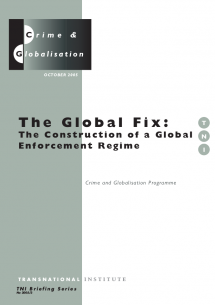Ideas into movement
Boost TNI's work
50 years. Hundreds of social struggles. Countless ideas turned into movement.
Support us as we celebrate our 50th anniversary in 2024.

This issue of Crime & Globalisation, tracks the history of the concept of organised crime and its metamorphosis into a "transnational" phenomenon allegedly posing a serious threat to global world order.

Editorial
In this issue of Crime & Globalisation, Michael Woodiwiss and Dave Bewley-Taylor track the history of the concept of organised crime and its metamorphosis into a "transnational" phenomenon allegedly posing a serious threat to global world order. They show how the United States has dominated the construction of a global enforcement regime by interlinking concepts of drugs prohibition and combating organised crime. The "limited and blame-shifting approach" to organised crime pioneered by the US, the authors argue, has steered attention away from corporate criminal activities towards conspiracies of criminal organisations.
This "dumbed down" version of what constitutes organized crime was embraced by the international community with passage of the 2000 UN Convention Against Organized Crime; a treaty viewed by Washington as a natural extension of the 1988 UN Convention Against Illicit Traffic in Narcotic Drugs and Psychotropic Substances. Such an understanding takes no cognisance of the criminogenic aspects of the current neo-liberal globalisation process, nor does it help meet the security needs of developing countries, particularly in relation to the increasing urban crime problems of the booming shanty towns of the South.
A first version of this briefing was presented to a seminar on Global Enforcement Regimes organised by the Transnational Institute in April 2005. The seminar looked at the emerging new Washington Consensus on how to fight, as a major global security threat, the underground "axis of evil" of drug trafficking, transnational organised crime and international terrorism. A body of multilateral agreements have already been put in place "to fight the scourge".
At the UN and G8 levels, conventions against transnational organised crime and regulations to counter money laundering are accepted, while the UN Security Council has set in motion a global programme against international terrorism. The pattern is remarkably similar to that of the US internationalisation of the war on drugs. Drug trafficking and related issues like organised crime and the laundering of illicit proceeds are first labelled as national security threats and this is then extended internationally. At European Union level, a similar process is taking place in order to harmonise security policy.
These agreements are reached at inter-governmental level (UN, G8, EU) and presented as a fait accompli before national parliaments. Furthermore, there are barely any mechanisms in place to evaluate the effectiveness or adverse effects of policy implementation. The emphasis is almost always on coercive and law enforcement measures and not on addressing root causes, which would result in unwelcome scrutiny of the current world order, and may even require a true internationalisation of many countries’ real security interests.
Increasingly, the current security paradigm is being questioned. Many are unconvinced as to effectivity and point to the likely averse effects on civil liberties, human rights and national sovereignty in the field of criminal justice. No-one doubts international co-operation is needed to address global security issues, but the effectiveness of the global enforcement regime currently under construction and whose interests are ultimately served is questioned. The problem is not to do with reaching consensus on transnational security problems being addressed at a transnational level. The problem lies with who is setting the agenda, and how transnational security policies are subsequently shaped.
The most striking aspect of the US approach is its exclusive concern with arresting and punishing harmful people rather than a more strategic approach that reduces the opportunity for harmful activity, Woodiwiss and Bewley-Taylor argue. Thus a flawed approach to organised crime has been fully internationalised. While the UN’s crime prevention agencies have been perpetuating a misleadingly simple analysis of organised crime with the notion that "bad guys threaten democracy and civilisation", other parts of the organization have produced studies that could contribute to a better understanding of transnational organised crime by looking at the mismanaged globalisation process.
Italian version:
An Italian version of the briefing is published in a series by Fuoriluogo, a monthly magazine that is distributed with Il Manifesto newspaper.
Pages: 32